Xiaohai in Dialogue with Ge Yulu: “Return to Me a World Untainted of the Mundane”
| March 20, 2025
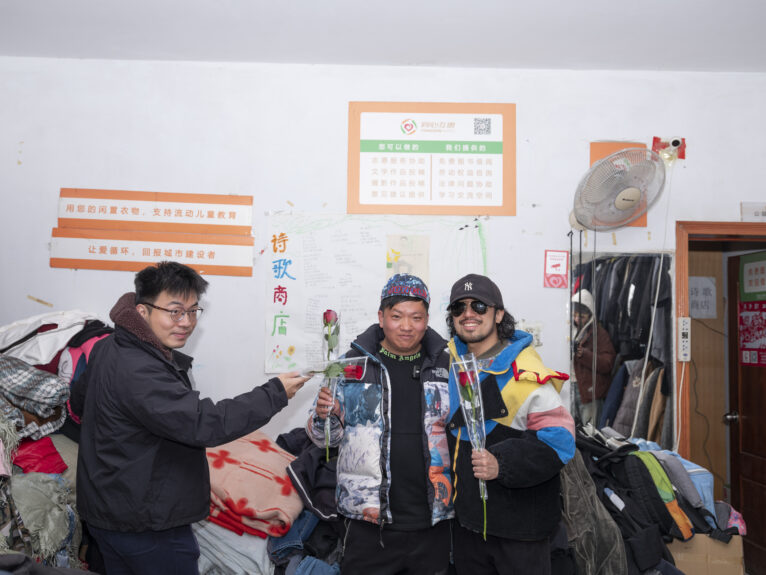
Ge Yulu (left), Xiaohai (middle), and Wang Dawei (right) in Picun, 2024
I first met Xiaohai at a poetry festival in Beijing, where the theme of the discussion was Beipiao—literally Beijing drifters, meaning workers seeking opportunities in Beijing without a local residence permit. His poetry struck a deep chord with me, and his life story left a lasting impression. Later, while organizing a youth-focused event in Chengdu, I invited him to share his experiences. At the event, he read Haizi’s Asian Copper in the Henan dialect, alongside music performance. I was completely moved. His performance gave me a fresh perspective on the Henan dialect, poetry, and live improvisation.
As we continued our conversations, I grew more curious about his life in Picun (literally, Pi Village, an “urban village” populated by migrant workers living in the periphery of China’s capital) and his upbringing. His words were imbued with a raw vitality—pain, outcry, and joy—a visceral testament to being alive. It was a stark contrast to the contrived artistry often seen today, where form shadows authenticity.
With this curiosity, our conversation began.
GY: Let’s start with your personal journey. You grew up in a rural village in Henan, and quit school after middle school. Is that right?
X: It’s a pretty bitter story, and I remember it vividly. It was the winter of 2002, and I was in ninth grade. One day, I came home from school to find my dad plucking cotton in the yard while chatting with a tall, fashionable man with dyed blond hair. His stylish appearance really stood out. Later, my dad told me he was a cousin.
My dad casually asked if I wanted to go with him to Zhengzhou to learn hairdressing. At first, I refused. That’s when my dad explained the real reason: our family couldn’t afford to send both me and my brother to high school. They had to choose one of us. I agonized over the decision for three days before reluctantly deciding to drop out. It wasn’t uncommon in our area, but it still broke my heart. After packing my things and leaving school, I walked home under the bright moonlight, feeling completely lost.
When I got to Zhengzhou, the hair salon owner refused to hire me because I didn’t have an ID and was too short. Back in the village, my teacher even visited our home to convince me to return to school. But I was young, stubborn, and ashamed, and my family’s financial situation didn’t help. In the end, I didn’t go back. Instead, through family connections, I enrolled in a sewing machine training course, which cost over 1,000 yuan—a significant expense for us. After paying another 1,000 yuan as an introduction fee, I got a job and left for Shenzhen with my classmates, beginning my working life.
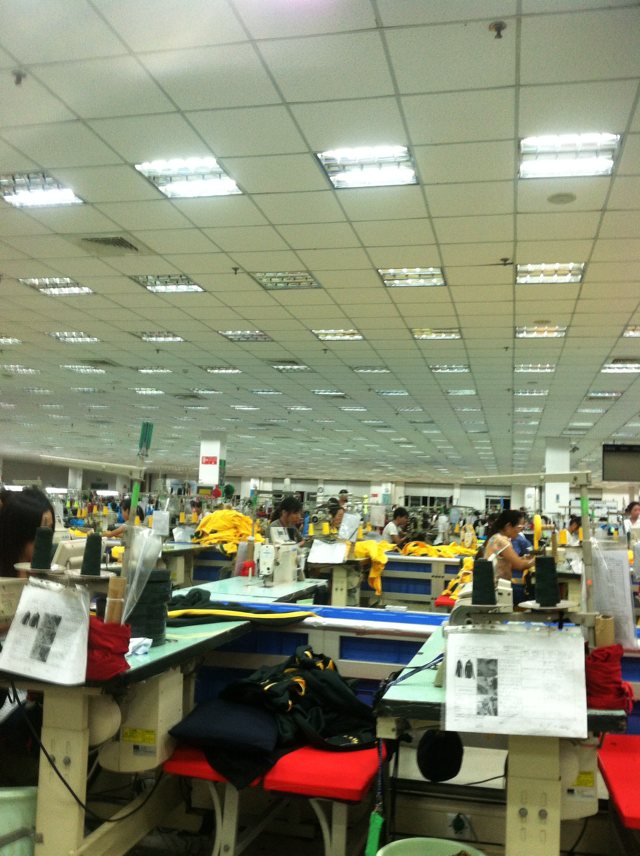
Interior of a Suzhou garment factory, photographed by Xiaohai, 2013
GY: How old were you then? How long did you stay in those jobs?
X: I was 16. My first job in Shenzhen was assembling cassette players in Buji. Within two days, I heard rumors that the factory often withheld wages, and being underage made things even harder. I quickly moved to another electronics factory in Longgang, where I worked for over a year. Since I was underage, I had to hide whenever there were inspections. It was tough.
A year later, I followed a colleague to a clothing factory in Humen, Dongguan. At that time, Guangdong was chaotic, and the train stations were notorious for robberies. So, during my four years in Guangdong, I didn’t dare return home. I worked in five or six different factories during that period.
In 2007, I finally went back home. Our financial situation hadn’t improved much. That year, our garlic harvest was abundant, but the market was terrible. A bag of garlic was sold for just 10 yuan, and much of it was thrown away. After helping my family sell garlic and plant wheat, I left again, this time heading to Ningbo because I had relatives there.
I wanted to change careers to mold manufacturing, which I heard paid well. But without qualifications or experience, I couldn’t find a suitable job despite searching for half a month. Winter came quickly, and the snow in 2008 was particularly heavy. Unable to afford to go home, I stayed and worked as a temp. The cold was brutal—I couldn’t even hold small mechanical parts because my fingers were frozen, and my legs felt like blocks of ice. I had to stomp around just to stay warm.
Poverty shaped my mindset: save everything, spend nothing. Looking back, it was absurd and pitiful. I endured freezing temperatures without buying socks or winter shoes. The more I saved, the harder it became to escape the cycle—a vicious loop that felt almost like fate.
GY: When did you first encounter poetry?
X: It was 2008, and I was 21. I was tired of the monotony of factory work and wanted to escape the mechanical routine to experience nature. I found a job on Meishan Island in Beilun, Ningbo, making woven bags. The island’s natural environment was beautiful, and there were few young people around. Most of my coworkers were older local women.
By chance, I bought a book called Three Hundred Tang and Song Poems for 15 yuan. That book changed everything. These poems had a profound impact on me. I’d learned some verses back in school, like “Spring sows one grain of corn; Autumn reaps in ten thousand more,” or “Of those who are dressed in fine silk; None has ever raised a silkworm.” They always stirred something within me, though I couldn’t quite explain why. At the time, though, I struggled to connect with the sweeping romanticism of poets like Li Bai. It felt too far removed from my world.
But after stepping into the working world, into the monotony of machines and the weight of uncertainty and frustration, poetry took on an entirely new light. Those feelings I’d carried, with no proper language to describe, suddenly found a home. Reading poetry again felt like finding something I’d been searching for all along, something so moving it almost brought me to tears. I realized that even the heaviest emotions could rest gently within the beauty of a verse, giving them meaning, even peace.
I started reading poems every day: “The spring tide rises, the sea levels swell; Moonlight peaks out, surging with the waves,” Or “My window frames the western mountain’s thousand-year snow; By the door moor ships from Eastern Wu ten thousand li away…”
GY: It’s clear that you love poetry deeply. Reciting it seems to ignite something in you, almost like you’re dancing with excitement.
X: Back then, I’d recite poems while working, talking to myself. The older women around me thought I was crazy. Fortunately, I was efficient enough that it didn’t affect my work. Poetry became my emotional refuge in a life I couldn’t escape. Besides poetry, I also loved music. When I was 17, I first heard the song Blue Lotus and Wang Feng’s Fly Higher. That’s when I realized music could touch the soul—it wasn’t just pop entertainment.
GY: Beyond providing emotional solace, did poetry bring any tangible changes to your life?
X: At the time, I read three to four hundred poems and wrote two to three hundred simple verses. I became almost obsessed. I even went to Suzhou to participate in China’s Got Talent, showcasing my poetry. I believe we can find faith and strength in traditional culture to find ourselves. That’s why I chose a roaring style to deliver my poetry. Unfortunately, the judges thought Tang poetry should be elegant and didn’t appreciate my roaring interpretation. So, I only made it past the preliminaries. Looking back, it was quite foolish.
My first love was also connected to poetry and music. In 2011, my mother suggested I switch to a larger factory, where I was lucky to meet a girl from Yibin, Sichuan. When I heard she liked Wang Feng’s music, I was instantly intrigued. One day, while working next to each other on the assembly line, we struck up a conversation. She even quoted a classic poem: “Tell me, what is the uttermost extent of pain, you say? Mine is a river swollen in spring and welling east away.” After reciting it, she asked why I always seemed so melancholic. I found her question amusing. Later, she texted me, inviting me to share some apples. I hesitated, bought a bottle of coke, drank it, and eventually decided to meet her. She brought apples, and I brought a bunch of bananas.
GY: So, over bananas in the evening, you two chatted and decided to start dating?
X: Well, not exactly. That night, we naturally hugged and kissed, reluctant to part. But at midnight, her dormitory was about to lock its doors, so she had to leave.
We were together for 105 days. After the Chinese New Year, her mother asked her to return home. At the time, I didn’t think much of it. I didn’t realize how hard it was to maintain a relationship. I naïvely believed that mutual respect was enough and didn’t even consider marriage. It wasn’t until she boarded the train, placed her luggage, and stood behind the window with tears streaming down her face that I felt a pang of sadness, though I couldn’t cry. She said nothing, just kept crying. When the train started moving, I suddenly became anxious and ran alongside it until it took a turn and disappeared from view. That was the last time I saw her, and it remains my only truly happy relationship.
Back at the factory, I even told the manager to ensure her wages were paid in full since she had to leave in a hurry. I felt heartbroken for a long time afterward and eventually resigned from the factory.
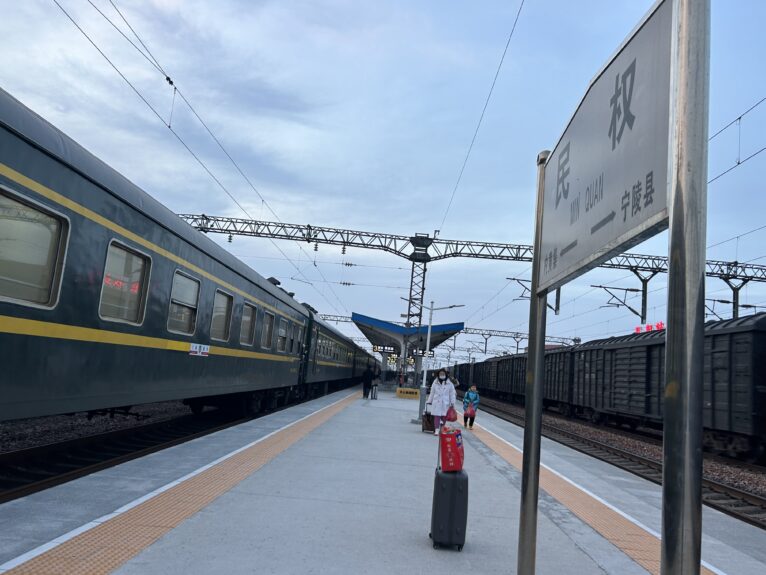
Xiaohai took this photo of a train station during his time as a migrant worker, 2016
GY: What happened next?
X: After leaving, I went to Suzhou and participated in the talent show I mentioned earlier. When it didn’t work out, I had to face reality again. I tried many jobs, such as real estate sales, but got fired after just a week. I also worked as a salesperson, promoting products like MSG and massage devices. The manager constantly gave us pep talks, but we couldn’t make any sales—the products were essentially scams.
Later, a relative recommended I go to Shanghai to work in a roast duck restaurant. I lasted a week before quitting. At that time, I felt restless and frequently changed jobs. I carried my bedding and books everywhere. Among my belongings was a large dictionary I had bought in Dongguan. I needed it to continue learning new characters for my poetry; otherwise, I couldn’t write. After all, I only had a middle school education and didn’t recognize many characters. So, I lugged that dictionary from Ningbo to Suzhou, then to Shanghai.
When I arrived in Shanghai, I wanted to try my luck in the bustling city, hoping to meet influential people. Carrying my bedding, I went to East Nanjing Road and found a Korean teppanyaki restaurant, where I worked as a server for a day. That evening, the manager asked me to clean the toilets. I was hired as a server, not a janitor, so I quit in frustration.
I wandered around Shanghai with my belongings until I saw a courier recruitment poster. I only cared about having food and shelter, so I started delivering packages. This was in 2012, back when couriers used electric scooters with large baskets on the back.
GY: How did being a courier impact you?
X: Delivering packages involved constant phone calls and running up and down buildings. I saw the vibrant, bustling side of the city as well as life in Shanghai’s alleyways. For instance, in a cramped, low-ceilinged house, a tall young man just emerged. And on the Bund, there were luxurious malls with multiple locked doors that required escorts to enter. It was eye-opening.
A friend later suggested I participate in a competition soliciting tributes in writing in Suzhou. Full of anticipation, I submitted 3,000 to 4,000 words brimming with ambition and read them aloud at the writers’ association. In the end, I received a 200-yuan bookstore gift card—nothing that truly changed my life. So, I returned to a garment factory.
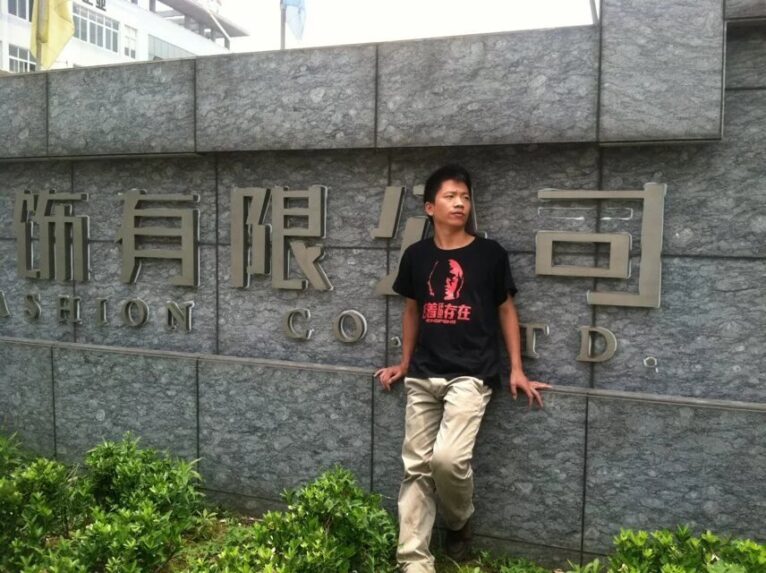
Xiaohai’s photo taken in front of a garment factory in Changshu, 2014
GY: After all that, you ended up back at the factory?
X: Yes. When I returned to the garment factory in 2012, I was deeply disheartened. By that point, I had been working for ten years, yet it felt like I hadn’t made any progress. During that period, I wrote a lot—it was an outlet for my pain.
I tried so many things, worked countless jobs, but nothing worked out. I was on the verge of collapse, my worldview shattered. I started to feel like there was no…
GY: No hope?
X: Exactly. When would it ever end? That’s when I wrote Chinese Workers. At the time, I questioned everything. Was I creating value or just producing garbage?
GY: Why did you feel that way? The factory made tangible products. How could it not create value?
X: Sometimes, when clothes didn’t turn out right, we had to rework them. But this so-called rework was just masking defects—items that might fall apart after one wash. These low-quality clothes would end up being thrown away. I knew I was deceiving people, creating waste, not value. I wasn’t earning much either, and I felt utterly exhausted with no hope in sight.
This state of mind left me profoundly confused. By my twelfth year of factory work, writing had become my only emotional outlet. From 2009 onward, I wrote almost daily, regardless of the factory I was in. If I skipped a day, I felt like I hadn’t truly lived. Even if what I wrote was immature, it was necessary.
The mental repression and anguish I experienced made me feel like my writing wasn’t flowing naturally but was being squeezed out by the heavy, monotonous, and numbing factory life—forced out by the cold, relentless machines.
GY: How many hours did you work each day back then?
X: In the Pearl River Delta, working long hours was common—15 or 16 hours a day was normal. When I moved to Ningbo, things got slightly better; it was about 12 hours a day. Occasionally, on weekends without overtime, it might drop to 8 hours.
GY: What do you mean by “no overtime on weekends”? Does that mean working on weekends was not considered overtime?
X: Yes, exactly. Overtime was normal during the week, and there was no such thing as a two-day weekend. During peak production times, even a single day off was a rarity. That’s why I always wanted to escape.
GY: And poetry was your only way to temporarily escape?
X: Yes, poetry was my only outlet, my only way to mentally escape. You could say poetry saved me in the factory workshop; otherwise, I would have collapsed long ago. Later, I drifted between jobs at places like Foxconn in Zhengzhou and Jiaxing. During the financial crisis, my salary dropped to just 1,000 yuan a month. My body was exhausted, but reading poetry always gave me a little energy.
During that time, I became a huge fan of Bob Dylan and Allen Ginsberg’s Howl. While working on Nike’s assembly line threading belts, I would sneak peeks at my poetry book. Reading poetry was the only thing that kept me going. One day after lunch, a coworker snatched my book while I was distracted. To my shock, he accused me of reading erotic novels. It was utterly absurd.
These works meant so much to me, giving me incredible mental strength, yet he dismissed them as something vulgar. It left me profoundly disheartened.
GY: Was Weibo around back then?
X: Yes. In my search for connection, I messaged everyone I could think of—Wang Feng, Xu Wei, Li Zhi, Zheng Jun etc.. Out of all of them, Zhang Chu replied. I’d send him what I wrote, and he’d offer me advice. He encouraged me to be more optimistic, both in my writing and my mindset. At the time, I was at rock bottom.
He also introduced me to a guy named Duo, who is part of the New Worker Art Troupe in Picun, which focuses on supporting migrant workers. Duo shared a lot of posts and resources with me, and that’s how I first connected with Picun. To be honest, I didn’t even know what Picun was about back then. But after 13 years of working factory jobs, I knew I couldn’t keep living that way. I was ready to grab hold of any opportunity and fight for my dreams.
So, I quit my job, bought a discounted plane ticket, and landed at the capital’s airport. After a long, bumpy journey, I finally arrived in Picun.
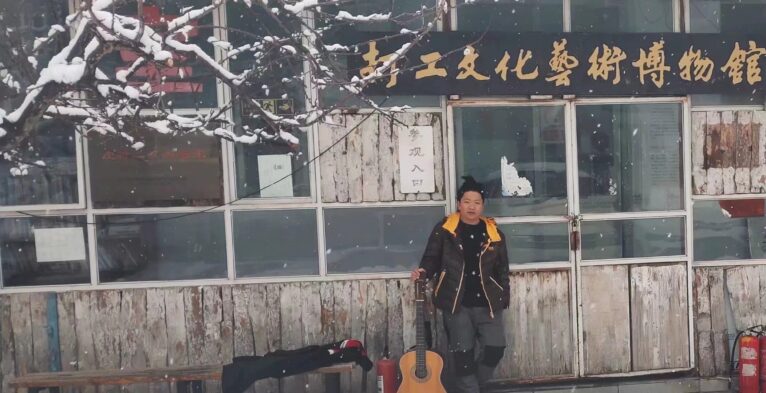
Xiaohai at the former site of the Migrant Worker Museum before its demolition, 2019
GY: What was your first impression of Picun?
X: I visited the Migrant Worker Museum, and it was incredibly moving. My chaotic 13-year journey as a migrant worker was now documented in a museum—a place that captured and presented our struggles. The very act of recording this was remarkable.
But as powerful as the experience was, I still needed a job.
GY: So, there was no dramatic turning point in your life?
X: Not at all. I didn’t know anyone there. After visiting the museum, I left my luggage in Picun and headed to the 798 Art District. That night, I planned to stay at an internet café, but Beijing was far harsher than the South. I was used to transcribing my poems into my QQ space at internet cafés. In Guangdong, you could pay for two hours and stay overnight. In Beijing, they kicked you out if you didn’t renew your time.
I didn’t understand it at first. With nowhere to go in the middle of the night, I ended up sleeping on a bench in the 798 Art District. But for some reason, the mosquitoes in Beijing were relentless, biting me so much that I couldn’t sleep. I spent the night wandering the art district aimlessly.
GY: So, you could only sleep once the mosquitoes retreated at dawn?
X: Exactly. Eventually, I found some work in Beijing—at Ladestation Restaurant in 798, a Thai restaurant near Yonghe Temple, and a café in Liangmaqiao. Since I loved music, I even worked at a bar in Sanlitun. But loving music and being a server are entirely different things. The music I once loved became noise during work, and I quit after a few days.
GY: These are all places I know well. Maybe we’ve crossed paths before…
X: Later, I saw an update about the Picun literature group on my WeChat Moments. I really wanted to join, but when I arrived, I saw a teacher who looked like a university professor giving a lecture through a window. I didn’t dare go in. Duo encouraged me, saying the group was open and free, and people could come and go as they pleased.
The second time, I mustered the courage to step inside. The atmosphere warmed me immediately. I had never encountered such a space—it felt so pure. The volunteer teachers, who traveled far to teach us for free, deeply moved me. In today’s world, having such a selfless, genuine group of people felt incredible.
GY: What does Picun represent to you?
X: Picun feels like a testing ground, a place where we pioneer in the face of harsh realities. I felt like I’d found a spiritual home. Once, Huiyu, one of the teachers, asked me why I hadn’t published a book, given all the things I’d written in factories. I couldn’t even imagine publishing a book—it seemed so far-fetched. At first, I thought he was just cheering me up, but he followed up multiple times, really pushing me to make it happen. That’s how Howl of the Factory came to be.
That was in the spring of 2017, a time of significant transformation for me. I was deeply moved by the changes. Huiyu even helped me find a job. Everyone advised me to settle down and stop drifting around. Since I didn’t have better opportunities, I started working here.
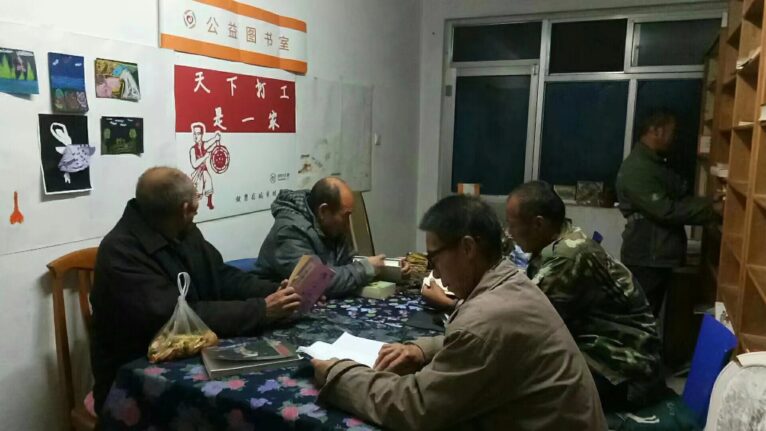
A book club event held at the public library in Picun, 2018
GY: You mean this secondhand clothing shop where we’re talking now?
X: Yes. I started working here, and just three days later, on April 24, Fan Yusu became famous. Her article went viral. Fan even messaged me, saying, “Xiaohai, drop me a like. I’m getting paid per word, and it’d be embarrassing if no one reads it.”
At the time, I was puzzled. Could you really write about such ordinary, mundane things? Didn’t everyone have experiences like that—messy, trivial feelings? I liked her post and even shared it on my Moments.
GY: You get into the mood very quickly when reciting poetry. Your emotions escalate so fast—I could never do that. I think it’s your gift. But I’m curious, do you see yourself as a poet? When did you start embracing that identity?
X: Before coming to Beijing, I always thought I’d be a rock star—haha! A singer. I thought I was writing lyrics, but later people told me they sounded like poems. I joked that I was a “shi-ren” (a poet), but also a “shi-ren” (a lost person). Honestly, I was embarrassed to call myself a poet and didn’t feel I deserved the title. If you measure it by poetry standards, my work isn’t deep enough. But I don’t reject the label either. Whether it’s poetry, lyrics, short verses, or even rants—if it carries a certain power, reveals something new, and evokes a different feeling, I believe that’s the purpose of creation. The form, medium, or subject doesn’t matter.
GY: Initially, you were drawn to classical Chinese poetry. What made you move away from those traditional forms after encountering modern poetry?
X: Classical poetry, with its fixed five or seven-character structures, has a lot of constraints. The first time I read Haizi’s work. He wrote, “Sister, tonight I am in Delingha, under the shroud of night. Sister, tonight I have only the Gobi Desert. At the edge of the grasslands, I hold nothing, not even a tear in my pain.” I was struck. His loneliness and confusion were expressed so viscerally. Before that, I didn’t know poetry could be written that way. In the factory or electronics workshops, I was too ashamed to even mention those experiences.
GY: Classical poetry avoids confronting such realities?
X: Exactly. Classical poetry is grand and open. I wrote lines like:
“The bright moon brims a jade cup with wine,
Dreams fade away as laughter graces the lofty heights.
A scholar’s robes brush the endless starlit expanse,
Casting crimson flames to ignite a thousand autumns.”
It feels expansive and unrestrained.
GY: But it seems disconnected from reality? Writing about “igniting a thousand autumns” while in an electronics factory feels like avoiding the real situation.
X: Exactly. Meanwhile, your supervisor might yell, “You idiot, you messed this up again!”—haha. Sometimes they’d even fine us. I remember once writing, “I have never truly found myself,” and the supervisor saw it. He said, “Your work is piling up, and you’re writing this nonsense?” Then he mocked my messy handwriting, calling it “chicken scratches,” and made me sign a fine. He tore the paper up right after. I was furious. Thankfully, he didn’t tear it to pieces completely. After he left, I picked up the scraps and pieced it back together at home.
GY: That’s such a Stephen Chow-esque image—dreams and emotions crushed by harsh reality. You couldn’t even pick up the scraps in front of him?
X: No way. He even fined me 100 yuan. When I signed the paper, I pressed so hard I nearly ripped it, as if I could break free of the constraints. But the reality was, if I left the factory immediately, I’d have no place to live and nowhere to go—I’d end up sleeping on the streets. Later, I heard about the “Sanhe Masters” (people working temporary gigs that pay by the day around the Sanhe Talent Market in Shenzhen) and realized that was also a way to live. Taking a month off sounded nice; you don’t make much money working anyway. But at the time, I didn’t know that was an option.
GY: Now that you’ve heard about the “Sanhe Masters,” how do you feel about them?
X: It makes sense. They must have gone through unimaginable hardships and no longer wanted to live like dogs. I think living in your own way is fine. Their choice is understandable, but there must be pain behind it. I’ve experienced moments where life felt worse than death.
GY: Exactly. They’re stuck in a cycle where they have no guarantees or a promising future, constantly sacrificing their freedom and enduring endlessly. Relaxing seems like a better alternative.
X: That’s right. In that situation, you’re invisible, ignored, and don’t even know how to communicate your struggles.
GY: From what you’re saying, I can see that if it weren’t for Picun, you probably wouldn’t have chosen to stay in Beijing.
X: Definitely. Before coming to Picun, I was just a lonely drifter in Beijing.
GY: In a way, it was Picun—or more specifically, its literature group—that gave you hope for the future and made you settle down.
X: Absolutely. Without this platform, how could I have met someone like you? You’re a very famous artist. Here, I’ve also met other amazing teachers. This place feels magical. It’s like the secondhand clothes in this shop—whether Gucci or Chanel, once they’re here, they’re sold as equals, each piece for 12 yuan.
GY: So, it’s not about Picun, Beijing, or any other city? None of that really matters to you?
X: You could say that, but I think places like this belong in urban villages. That’s where its character fits. It wouldn’t work in an art district—it wouldn’t feel right. Urban villages are raw and vibrant. They’re rough, full of life, like wild grass or rolling stones—they’ll always find a place to settle.
GY: To what extent do you think Picun’s administrators support this?
X: It’s hard to say. It’s always been a sensitive issue. They neither oppose nor openly support anything. Without these organizations and people, Picun might just be an ordinary place.
GY: I’ve seen online that Cui Yongyuan hosted a Spring Festival gala for workers, Yuan Ling wrote about Picun siblings, and Gu Tao sang Farewell when the museum closed. There’s also Fan Yusu and Chen Nianxi, your predecessors at this shop. All these figures passed through Picun—what does that mean to you?
X: I’ve witnessed many remarkable things around me. While I may not have become famous myself, it’s truly fulfilling to see how an ordinary person can rise to prominence. People like Chen Nianxi and Fan Yusu have remained the same despite their newfound fame. They are still humble, grounded and focused on their work. They serve as role models for me. Most of them are now able to support themselves solely through their passions.
GY: At least they don’t have to worry about their next job.
X: True, that’s definitely a good thing. Nianxi now makes a living entirely through his work as a writer, which is great.
GY: Why do you think these groups gather in Picun? There are plenty of other urban villages in Beijing—what makes Picun special?
X: Honestly, it’s a coincidence. The New Workers Art Troupe chose Picun. If they had chosen Ma Village instead, worker culture might have spread there. Picun could disappear, but as long as there are people like this, thousands of Picuns could emerge.
GY: Beyond that, tell me about your daily life. What are your neighbors like, and how do you sustain yourself through work here?
X: You see, today my boss messaged me, saying that tomorrow morning we’ll need to head to the warehouse. The elevator there broke down recently, so we’ll have to carry packages, like bundles of clothes, up the stairs. I said it’s fine—after all, we’ve rested enough, and now it’s time to work. Tomorrow I’ll probably wake up at 8 a.m. for another exhausting day, drenched in sweat. This is real life. You can have ideals, but they don’t conflict with reality. You can look up at the stars while maintaining your work because that’s what supports your life.
GY: From that perspective, do you ever feel that poetry, despite your devotion, hasn’t really changed much for you and perhaps has let you down?
X: Not at all. I just think my ability hasn’t reached its full potential yet—I haven’t worked hard enough, or written well enough. I don’t feel let down because poetry already saved me in the factory. Even now, it’s an important source of spiritual strength for me. There’s no betrayal—at most, the timing hasn’t come yet, or I haven’t put in enough effort.
GY: So, the things poetry has to offer—you’ve already received them?
X: Yes. When you finish writing, poetry has already reciprocated. For example, last night I stayed up until 2 a.m. writing the poem we shared today. At that moment of completion, it felt worth it. There might not be any follow-up, but it was already worth it—it had already bloomed.
GY: So, do you think the title of “poet” is something you give yourself, or something society gives you?
X: I think it’s more of something society assigns. For me, it’s just a form of an internal dialogue—a reflection or monologue. From a poetic perspective, I hold myself to high standards. I don’t think my work is artistically strong enough yet, but I do have my own style—a kind of uncontrollable, unrestrained flow, like mud and sand rushing together. That’s my style. I hope to write poems that truly stand out.
As a poet, you need a representative piece, but honestly, I don’t have one yet. Just today, a documentary filmmaker asked me, “Xiaohai, which of your poems is your favorite?” I really didn’t know how to answer. They wanted me to pick one, but I couldn’t choose.

A landscape photo taken by Xiaohai, 2023
GY: So poetry writing is an extension of your mental “state” as we discussed earlier? You write poetry mainly to feel alive, not to position or promote your work from a professional standpoint.
X: Exactly. I haven’t approached it that way. Last year, I wrote a poem called From Sun Wukong to Sisyphus. The inspiration came from a hike in Pinggu, on a desolate mountain. The climb left me utterly hopeless. I didn’t know where to descend, had no food, no water, and was exhausted.
Another time, I was rowing on the Wenyu River with two coworkers. None of us knew much about boats or water. We rowed from the west side of the river to the east but got stuck in the middle and couldn’t make it back. We struggled for over an hour. They were both terrified and drenched in sweat. Eventually, we gave up, collapsed in the boat, and burst into laughter. It was absurd—just like our circumstances, like Sisyphus rolling the stone up the hill. That’s when I wanted to write Sisyphus on the Banks of the Wenyu River.
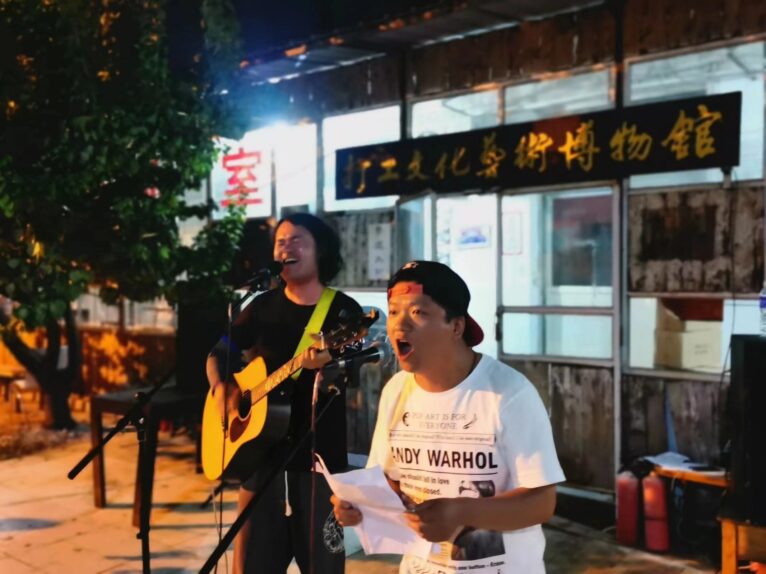
Xiaohai performing poetry at the former site of the Migrant Worker Museum, 2018
GY: Earlier today, when you took me on a walk near Picun, you pointed to Xishan (the Western Hills) from a bridge. I’ve crossed the Wenyu River Bridge countless times on my way from Yanjiao to the city, but I never noticed you could see Xishan from there. It wasn’t until you mentioned it that I realized—it’s right there. That feels like a metaphor. It’s massive, silent, invisible—until someone points it out. Your poetry gives me that same feeling.
X: Exactly. Sometimes, being trapped in real-life struggles feels like spinning in the whirlpools of the Wenyu River—heavy and absurd. But poetry is like Xishan, suddenly revealing itself at a certain moment. It brings clarity, brightness, and a sense of meaning and existence.
GY: You mentioned that your poetry primarily reflects reality and that its artistic quality might be lacking. But the editorial team compiled an appraisal of your work—a full eight pages. When I printed them, pages fell out from the printer one by one, filled with praises from all walks of life.
X: Even with so much praise and recognition, I still feel my poetry’s artistry is insufficient. When I first started writing, my inspiration came entirely from lyrics. For example, a line from the Rolling Stones: “What can a poor boy do/ Except sing for a rock and roll band?” That kind of power was immense. Back then, my poetry drew mostly from emotions like loneliness and confusion, which was more raw and abstract.
Later, through studying with a literary group and learning about poetry-writing techniques from the teacher Shi Libin, I discovered something profound: the ending of a poem can be like pulling out a piece from a stack of building blocks: suddenly, everything collapses in a cascade, leaving a powerful impact. Most of my poetry now is still driven by raw emotion, with technique playing a supporting role, but I hope to explore more and push my boundaries further.
GY: You mentioned that poetry has enriched your life. What have you achieved this year specifically?
X: I’ve had quite a few achievements this year. I published an article in Beijing Literature and received over 6,000 yuan in royalties. That same piece was also included in Henan Prose and Poetry Selection, which, although it didn’t pay much, felt like a form of recognition. Another piece about my experience as a migrant worker was translated into English and published in the UK’s Granta magazine—they paid me 700 pounds. This year has been very meaningful to me.
GY: But these rewards aren’t enough to make you a professional poet.
X: True, but I’m already very content. For me, this recognition feels immense, itself already a success.
GY: To wrap things up, would you share one more poem? Even if you feel you don’t have a representative piece, maybe pick one that resonates most with you.
X: Sure. Here’s a poem I wrote back in 2016 while working at an electronics factory in Jiaxing. It’s a reflection on love:
“All my youth dissolves in silent decay,
All my love meanders through riddles astray,
All my hope takes root amidst ruins gray.
As March slips by, empty and fleet,
I wield a brief verse to defy the concrete.
All my pride lies humbled by hunger’s claim,
All my dreams, fragile, shatter in flame,
All my freedom, adrift, is bound by its name.
When March returns with its gentle refrain,
Take my brief verse—
And return to me a world
whole and untainted of the mundane.”
Ge Yulu is a cultural and arts professional who combines independent creative work with curating and writing. His recent focus has been on amplifying marginalized yet compelling narratives and values, aiming to contribute to a more inclusive and diverse society.
Xiaohai, born in 1987, has worked as a frontline laborer for 20 years. He is one of the featured subjects in the documentary Where Is My Flight Home(2020) and a member of the Picun Literature Group. His debut poetry collection, Sisyphus on the Wenyu River, is set to be published in 2025. Xiaohai’s works have been featured in Beijing Literature, Dandu, The Paper, and Granta.


